Russian authorities have unofficially reined in retail fuel prices, a sensitive issue for motorists before key elections, traders and sources in companies said Thursday.
The oil companies already had effectively put a lid on gasoline prices at pumping stations since mid-August, fearing a backlash from the government before the general elections in December and presidential poll in March.
Salesmen are now talking about direct verbal orders from the government not to increase prices.
"There won't be any moves before the elections, although there are no written directives from Moscow," said a worker at a TNK-BP retail station in Saratov, 880 kilometers southeast of Moscow.
"We were about to increase the price, but we were told to draw in our horns. 'Are you crazy? There are elections coming!' they told us," said an official with LUKoil in Volgograd.
Retail prices have flatlined across the country despite skyrocketing wholesale prices for petroleum products.
After anti-monopoly regulators slapped companies with hundreds of millions of dollars of fines for expensive fuel over the past year, retail stations have been wary of raising prices, and their margins have been squeezed almost to nothing.
Wholesale prices for the most widely used gasoline, branded A-92 in Russia, have increased 33 percent year to date, while retail prices have risen 10 percent as they ground to a halt by autumn.
After the March election, Prime Minister Vladimir Putin — the most popular politician in the country, according to polls — is poised to return to the Kremlin after a four-year break, while President Dmitry Medvedev is likely to take over the government.
According to the Avtostat statistics agency, the total number of cars in Russia, which has a population of over 140 million, rose 3.8 percent to 34.35 million in 2010.
In February, Putin demanded price curbs, which resulted in fuel shortages in the spring across the country, the world's top crude producer.
The government has since obliged companies to create an emergency fuel fund and has cut export duties for light refined products to stimulate high-grade fuel output.
A Message from The Moscow Times:
Dear readers,
We are facing unprecedented challenges. Russia's Prosecutor General's Office has designated The Moscow Times as an "undesirable" organization, criminalizing our work and putting our staff at risk of prosecution. This follows our earlier unjust labeling as a "foreign agent."
These actions are direct attempts to silence independent journalism in Russia. The authorities claim our work "discredits the decisions of the Russian leadership." We see things differently: we strive to provide accurate, unbiased reporting on Russia.
We, the journalists of The Moscow Times, refuse to be silenced. But to continue our work, we need your help.
Your support, no matter how small, makes a world of difference. If you can, please support us monthly starting from just $2. It's quick to set up, and every contribution makes a significant impact.
By supporting The Moscow Times, you're defending open, independent journalism in the face of repression. Thank you for standing with us.
Remind me later.






